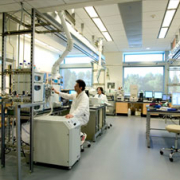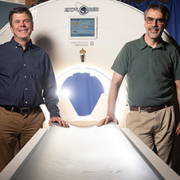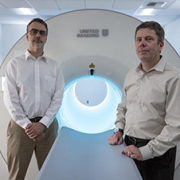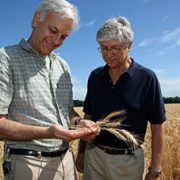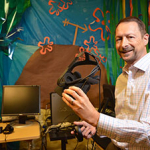AB 2664 Innovation Funds Show Early Signs of Impact at UC Davis
/in News, Uncategorized /by Aj Cheline
A $2.2 million investment from the state is propelling new innovation and entrepreneurship efforts at the University of California, Davis through enhancements to its related infrastructure, resources and business training programs. The one-time funding was received in early 2017 under Assembly Bill 2664 — the UC Innovation and Entrepreneurship Expansion Bill authored by Assembly member Jacqui Irwin, D-Thousand Oaks — and is showing signs of early impact in terms of new technologies, startup companies and talent development.
“By expanding our innovation and entrepreneurship infrastructure and supporting programs, UC Davis is seizing the opportunity to effectively translate its close to $800 million of annual research funding into regional and statewide economic growth,” said Dushyant Pathak, associate vice chancellor for research. “Although we are less than a year into the funding, we are already noticing an impact through our programs.”
UC Davis is using the funds to launch new programs and expand existing ones that provide entrepreneurs and innovators the resources and guidance needed to overcome barriers to successful innovation and early-stage technology commercialization. The programs represent a coordinated effort amongst several campus entities including the Office of Research, Institute for Innovation and Entrepreneurship, Engineering Student Startup Center, Office of the Provost, Office of Graduate Studies, and Internship and Career Center.
A summary report sent to state officials by the University of California Office of the President contained some examples of the range of activities and related impact supported by AB 2664 funds across the system. At UC Davis, use of these funds is demonstrating a positive impact through programs that have advanced 15 technologies through proof-of-concept grant programs, assisted 34 startup companies and provided training and development to nearly 500 entrepreneurs.
Some of the notable new and expanded programs providing support include:
- Food and Ag Entrepreneurship Academy: Expanded business training workshop and mentorship series developed and implemented by the Institute for Innovation and Entrepreneurship, focused on commercializing technologies at the intersection of food, agriculture and health.
- Advanced Student Career Enablement and Development (ASCEND) Program: New cross-campus collaboration, involving Graduate Studies, the Internship and Career Center, the Institute for Innovation and Entrepreneurship and the Office of Research, with initial implementation through the Leaders for the Future pilot program focused on helping PhD candidates and postdoctoral scholars connect with non-academic career opportunities through industry engagement and business training.
- Proof-of-Concept Grants developed and managed by Venture Catalyst in the Office of Research: Expansion of the Science Translation & Innovative Research (STAIRTM) Grants to include opportunities for graduate students to participate on project teams, development of commercialization clinics to facilitate market focus and the STAIR-Plus™ Grant that provides additional support to STAIR Grant recipients who have successfully achieved project milestones and are poised for commercial impact pending specific additional targeted results. Also launched was the new Data, Informatics & Application Launch (DIALTM) Grants, which provide targeted funding for software and data informatics projects with commercial potential.
- Creator Challenge Series: New undergraduate student maker competition organized by the Engineering Student Startup Center in the College of Engineering, as a four-phase event with supplemental skill-building workshops for student entrepreneurs, culminated in an event where teams presented in a competition for proof-of-concept funding.
- Distributed Research Incubation & Venture Engine (DRIVETM) Network: Expanded research and development capabilities within the Venture Catalyst DRIVE Network comprising business incubation facilities available to university-affiliated startups and community-based entrepreneurs, by placing 10 pieces of technical equipment that enhance targeted areas for developing companies. The newly available equipment has helped to catalyze a new partnership with The Urban Hive and I/O Labs, an expanded partnership with HM.CLAUSE, and the move to a new facility for Inventopia, all of which significantly expands the capabilities of campus innovators, university-affiliated startups and local companies.
- Discounted Access to Research Translation Services (DARTSTM) Program: New program that provides startups participating in Venture Catalyst’s Smart Toolkit for Accelerated Research Translation (START™) program access to state-of-the-art services and equipment at designated UC Davis core research facilities at competitive rates designed to address the capital constraints of startups. A complementary program was also launched for participants in the DRIVE network with access to credits to be used at DARTS core facilities.
A good example of the how these programs are helping campus entrepreneurs develop solutions that address societal needs is the progress of Tony Simon, professor of psychiatry and behavioral sciences and co-founder of Cognivive, who is developing video games that act as “digital medicines” with the initial objective of treating children with cognitive impairments. Simon, one of three recipients of the STAIR-Plus Grants, was awarded $20,000 in funding to further advance his technology beyond early proof-of-concept stage.
“AB 2664 funds have been instrumental in helping us advance our digital treatment prototypes towards efficacy and commercialization by helping us move the early, desktop computer versions of our neurotherapeutic video games to a virtual reality delivery platform that allows us to much more directly impact the neurocognitive systems whose functioning we aim to improve.” Simon said. “On top of that development work, the ongoing commercialization clinics and business training workshops we are participating in, are ensuring that we don’t just develop really effective treatments but that we also are best prepared to actually get them to those people who really need them.”
Another example of the direct impact of these programs is the work of an undergraduate team of students that received the first place prize in the Creator Challenge Series. The team, named JAPA, short for Just a Parking App, developed a solution that provides real‐time parking spot availability and navigation to drivers via an app. “With the prize money, the team and I were able to push our product further by ordering the necessary components that we would not have normally had the money to buy,” said Mathew Magno of JAPA. “Since then, we have been testing and developing two types of sensors for JAPA and we have progressed tremendously.”
Plans to utilize the funding run through 2019, with the majority to be disbursed through the 2018 fiscal year. Some of the new programs that will be implemented include the Little Bang! student oriented micro-grant poster competition that is launching in conjunction with the Big Bang! Business Competition, the Central Valley Entrepreneurship Academy that is launching in partnership with UC Merced in the fall and the Aggie Innovation and Startup Symposium which will include workshops with content addressing the experiences of underrepresented populations and include speakers from the region who can serve as role models and mentors.
For more information on how funds from AB 2664 are being used at UC Davis or opportunities to participate in the related programs, please contact [email protected].


